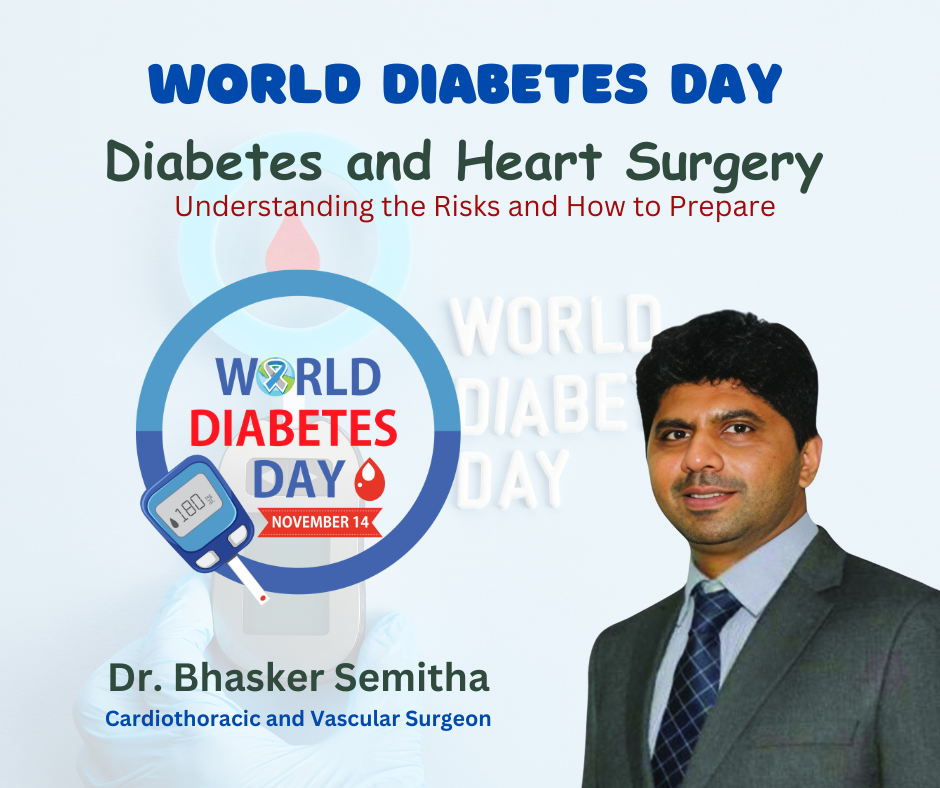November 14th marks World Diabetes Day, a reminder of the global impact of diabetes and the importance of awareness, prevention, and management of this condition. Diabetes is a significant risk factor for heart disease, and for patients with both diabetes and cardiovascular issues, heart surgery presents unique challenges. As a CVTS (Cardiovascular and Thoracic Surgeon), I often guide patients through this complex journey. Here, we’ll discuss the critical connection between diabetes and heart disease, the risks involved, and how to prepare for heart surgery if you have diabetes.
The Link Between Diabetes and Heart Disease
Diabetes, particularly type 2, significantly raises the risk of heart disease due to factors such as chronic inflammation, high blood glucose levels, and insulin resistance. These issues damage blood vessels and can lead to the buildup of plaques in the coronary arteries, increasing the likelihood of conditions like coronary artery disease, which may require surgical interventions such as coronary artery bypass grafting (CABG) or valve repair or replacement.
Risks Associated with Diabetes and Heart Surgery
Heart surgery is often life-saving, but diabetes introduces specific challenges that elevate the risk profile, including:
- Higher Risk of Infections: Diabetes can slow wound healing and increase susceptibility to infections, particularly in surgical wounds.
- Impaired Blood Flow: Circulation issues are common in diabetic patients, which can delay healing and recovery after surgery.
- Blood Glucose Management: Surgical stress can lead to blood glucose fluctuations, increasing the likelihood of complications during recovery.
- Postoperative Complications: Diabetic patients have a higher risk of kidney dysfunction, chest infections, and atrial fibrillation (an irregular heartbeat) after surgery, requiring close monitoring.
Preparing for Heart Surgery: Steps for Diabetic Patients
1. Optimize Blood Glucose Levels
Maintaining a stable blood glucose level pre-surgery is essential for reducing risks. Aim for an HbA1c level under 7% if possible, and work closely with your endocrinologist to ensure well-managed diabetes in the months before surgery.
2. Medication and Insulin Management
Discuss your diabetes medications and insulin use with your care team to avoid fluctuations in blood sugar around surgery time, as medications may be adjusted by your endocrinologist or surgeon to stabilize blood glucose levels.
3. Follow a Balanced Diet
A low-glycemic, nutrient-rich diet helps stabilize blood sugar and support immune function and healing. Consult with a dietitian to create a pre- and post-surgery nutrition plan.
4. Stay Physically Active
Mild to moderate exercise helps improve blood circulation, support heart function, and stabilize blood sugar. Discuss an appropriate activity plan with your healthcare provider before starting new routines.
5. Focus on Wound Care and Infection Prevention
Diabetes can slow wound healing, making infection prevention essential. Practice good hygiene, maintain stable blood glucose levels, and carefully follow all wound-care instructions from your medical team.
6. Manage Other Health Conditions
People with diabetes often have high blood pressure and high cholesterol, both of which need to be well-managed before surgery to improve outcomes.
Post-Surgery Expectations
Strict blood glucose monitoring remains crucial after surgery, as blood sugar fluctuations can slow wound healing and increase infection risk. Lifestyle changes, including a heart-healthy diet, regular exercise, and medication adherence, will support recovery and heart health long-term.
Cardiac rehabilitation programs provide structured exercise and lifestyle advice tailored to diabetic patients. Regular follow-ups with your cardiologist and endocrinologist will also help you monitor progress and prevent future complications.
In Conclusion
While heart surgery presents added challenges for diabetic patients, thorough preparation and careful management of blood glucose and other health factors can significantly improve surgical outcomes. At Hridayanavjivanlaya, we take a multidisciplinary approach to ensure each patient receives individualized care before, during, and after surgery.
This World Diabetes Day, let’s focus on the steps we can take to better manage diabetes and heart health, paving the way for safer and more successful heart surgeries.

